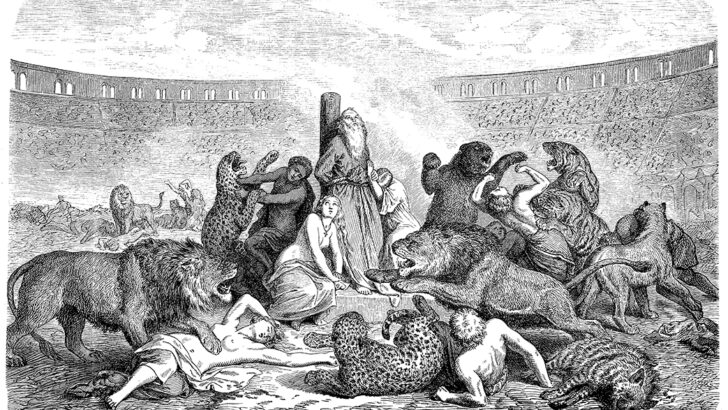A Dubliner, who liked a jar, was courting a Belfast woman in the eighties and was delighted when she invited him and his friends to Clonard. It was Sunday, and having enjoyed themselves the night before, they rushed to get ready – only to find that Clonard was not a local pub, but a monastery.
I was reminded of the tale after reading about a new Church of England study, which suggests that the term “church” is increasingly being dropped.
The report from the Centre for Church Planting Theology and Research examined the language in 11 dioceses, where 900 new churches had started in the past ten years. The study found that none had used the traditional phrase “church plant” as the primary way to describe the start-up. Words such as “community” or “congregation” were preferred.
“Daft revision,” was the conclusion of Dr Giles Fraser, the Anglican vicar of St Anne’s, Kew. But a C of E spokesman told the Daily Telegraph that the word “church” did not comprehensively describe all the “new things” being done that were beyond traditional bricks and mortar. This included the controversial “silent disco worship” at All Hallows in east London, aimed at attracting young adults (Critics call this new trend in CofE Cathedrals “the rave in the nave”).
Frankly, this bid to be modern smacks of desperation. But this is the least of the CoE’s problems these days.
Last week it was reported that college chaplain, the Rev. Dr Bernard Randall, has launched fresh legal action against his former employer, Trent College. He is accusing the school of discrimination, harassment, victimisation and unfair dismissal. This is a long-running legal saga from 2019.
The Rev. Randall’s troubles began, it seems, when the school began working with an organisation called Educate and Celebrate, an approved CoE resource, to develop a LGBT+ curriculum for the school.
In a sermon, the Rev Randall told pupils they did not have to accept ideas and ideologies from LGBT activists. And he encouraged discussion and reasoned debate. “You should be no more told to accept LGBT ideology,” he said, ”than you should be told you must be in favour of Brexit or must be a Muslim.”
Sounds reasonable but some pupils were offended and complaints were made. During subsequent investigations by the school and at diocesan level, the chaplain repeatedly maintained that Christian marriage was between a man and a woman.
He was dismissed from the school, and at one point he was even referred to counter-terror police on the grounds he was risking “radicalisation”.
The Rev Randall lost his initial claim for “unfair dismissal” in the Employment Tribunal. Among its findings? His reaction to the LGBT course was extreme.
His claim of victimisation, harassment and discrimination was also rejected but he is now appealing that, with help from the Christian Legal Centre. This time the focus is on his right of religious belief.
Following a series of complex legal and ecclesiastical processes, the Rev Randall claims he has been blacklisted in the Church of England. He has not been able to secure a post and says he just wants “his life back”.
He is not the only one who feels rejected after standing up for traditional Christian views on marriage and sex.
The Rev. Brett Murphy (who quit the Free Church of England when it allowed same-sex blessings) endured a formal procedure last year for calling the Cof E’s first transgender Archdeacon a “bloke”. Another complaint against him, which was not upheld, was that he had criticised prayers put forward for the King’s coronation which described Jesus as “our sister”.
The Bishop of Derby and the Archbishop of Canterbury Justin Welby have been criticised by groups such as Christian Concern over their handling of Randall’s case. Indeed, one of the key criticisms is the failure to support a clergyman standing up for Christian teaching.
However well-intentioned, the Archbishop of Canterbury – who made the Mail on Sunday’s Most Woke List in 2023 – does seem to be leading the Church in a rather odd direction. In a subsequent interview with the New Statesman, he said: “Better to be woke than asleep.”
Yes, he admits to struggling with issues – don’t we all?
There is a reason Christians were thrown to the lions – our belief system challenges a world that wants to do its own thing.
Christianity comes with a cross – and has never been easy, especially when it comes to marriage and sexuality. Christ himself shocked his apostles for his “hard teaching”.
Frankly, we all need to wake up, and make sure that we Christians don’t throw each other to lions.
Lord knows the Roman Catholic Church (community if you prefer) is far from perfect.
But, as we struggle with our own issues, and continue on the Synodal path, let us be wary of woke.
Let us be awake to the Holy Spirit, not the spirit of the age.
And let us stay close to Jesus, the Living Bread, who points us not just to his body and blood in the Eucharist, but his own bread: the will of the Father.
***
It was great to see the crowds at Knock on my annual August pilgrimage, after the lean lockdown years. Fr Richard Gibbons, Rector of Knock Shrine, who graciously thanked the people for turning out in great numbers on the Feast of the Assumption, reminded us of an old Irish saying: God’s help is nearer than the door.
***
As I made a treacherous dissent down Croagh Patrick the other day, I was amused to hear a little girl tell her sister, who wanted a bit of craic, that she was “focussed on not falling right now”. I laughed audibly – pondering later how this particular pilgrimage is a metaphor for life in general. The challenge is always to have good fun – without falling.


 Martina Purdy
Martina Purdy